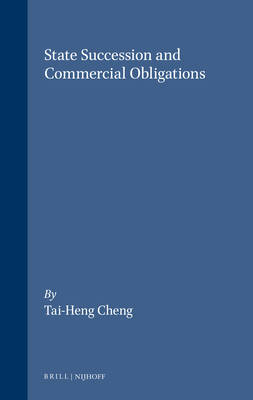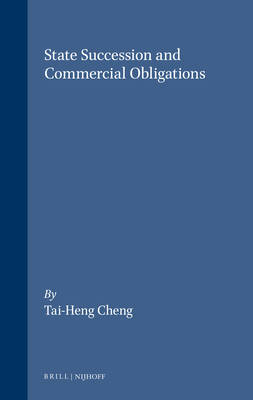
- Retrait gratuit dans votre magasin Club
- 7.000.000 titres dans notre catalogue
- Payer en toute sécurité
- Toujours un magasin près de chez vous
- Retrait gratuit dans votre magasin Club
- 7.000.0000 titres dans notre catalogue
- Payer en toute sécurité
- Toujours un magasin près de chez vous
308,45 €
+ 616 points
Description
State Succession and Commercial Obligations sets out to answer once and for all the age-old question: Do commercial obligations survive state succession? Tai-Heng Cheng accomplishes this goal via careful analyses of efforts by the United Nations to codify the law of state succession, as well as of recent state successions involving East Timor, Hong Kong, Macau, Yugoslavia, Czechoslovakia and the Soviet Union. The insightful text identifies a common thread running through these seemingly disparate events. Because of globalization and our interdependence, transnational decision-makers have collectively shaped international law to protect the international infrastructure from being disrupted by state succession and to protect entities from being debilitated by post-succession obligations.
State Succession and Commercial Obligations makes another major breakthrough by showing that the policy considerations and decision-making processes are similar in both state and government successions. Unlike prior theories that were bound by technical distinctions between state and government succession, this book's approach helps decision-makers bring order to both state and government successions that continue to be problematic today, such as the "regime changes" in Iraq, Afghanistan and Kosovo.
State Succession and Commercial Obligations is the only major treatise in fifty years to appraise the global development of the law of state succession and commercial obligations. This treatise is indispensable to legal scholars seeking to understand contemporary international law, judges and arbitrators adjudicating succession disputes, and transactional and trial lawyers representing financial institutions, corporations and states when succession is imminent or has occurred. Because this book distills complex legal concepts into elegant ideas, it is also fascinating reading for a general audience that has an interest in global affairs and the transformative successions since the end of the Cold War.
Published under the Transnational Publishers imprint.
Spécifications
Parties prenantes
- Auteur(s) :
- Editeur:
Contenu
- Nombre de pages :
- 500
- Langue:
- Anglais
Caractéristiques
- EAN:
- 9781571053596
- Date de parution :
- 19-07-06
- Format:
- Livre relié
- Format numérique:
- Genaaid
- Dimensions :
- 163 mm x 239 mm
- Poids :
- 952 g

Les avis
Nous publions uniquement les avis qui respectent les conditions requises. Consultez nos conditions pour les avis.






